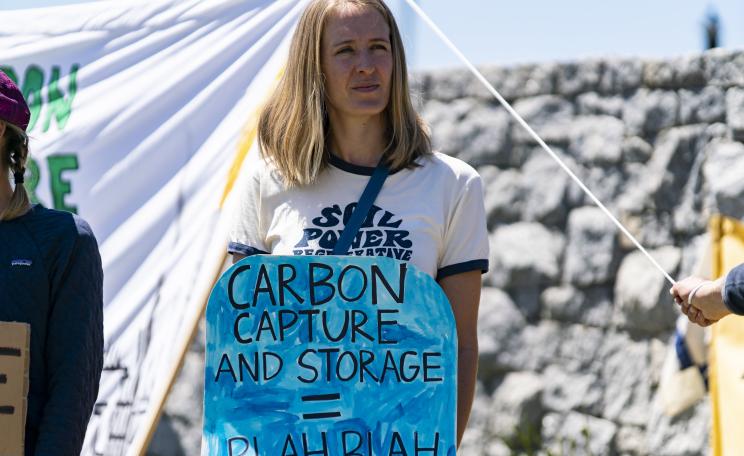Human rights treaties binding on corporations and their supply webs, ethical procurement, worker and community led decision making, can all play a role.
The recent mainstreaming of the Green New Deal framework has intensified scrutiny on oil majors.
However, the same cannot be said of global extractivist power - especially mining companies, who see the climate crisis as an opportunity to reinvent themselves and guarantee their bottom line.
Supported by the World Bank, the mining industry has cynically positioned itself as key actors in the energy transition, claiming they are needed to provide the minerals and metals to meet growing renewable energy demand.
This series of articles has been published in partnership with Dalia Gebrial and Harpreet Kaur Paul and the Rosa Luxemburg Stiftung in London. It first appeared in a collection titled Perspectives on a Global Green New Deal.
Batteries
Yet, many of these same companies are heavily invested in fossil fuel extractors, and are among the world’s highest corporate emitters.
The mining industry, along with other extractive industries, has been at the heart of a colonial model which continues to bring profits to multinational corporations and the wealthy few, while dispossessing countless communities of their lands, water and livelihoods and exploiting workers at the expense of their health and well-being.
Miners are also amongst the most mistreated workers in the world.
In July 2019, at least 43 artisanal miners died in the Democratic Republic of the Congo (DRC), due to a mine collapse at an industrial copper and cobalt mine owned by Anglo-Swiss multinational Glencore - cobalt is a vital part of electric car batteries.
Protest
UNICEF estimates that 40,000 children work in mining across the south of the DRC. Meanwhile, Glencore sees itself as part of the energy transition powering the electric vehicle revolution.
During the pandemic, multiple governments declared mining an essential activity, or responded to industry pressure to do so after a brief shutdown.
Mining operations became vectors of the disease - for workers and rural communities.
As companies profiteered from the pandemic, threats to land defenders exercising legitimate protest increased, and the regulatory groundwork was laid to reposition and bolster extractivist industries.
Recovery
The conversation in the North has turned to the need for a ‘green’ recovery: substantial stimulus packages to re-activate economic activity, doused in largely cosmetic green-growth commitments that do little to address the systemic nature of the climate crisis.
With many Southern economies forced to rely on resource extraction for income, falling demand and prices will not only further expose the vulnerabilities of their economies, but will cement the
logic that increasing production of such resources is the sole tool for economic recovery.
Human rights treaties binding on corporations and their supply webs, ethical procurement, worker and community led decision making, can all play a role.
However, increasing the rate and scale of extraction will only result in huge environmental, social and health impacts for people and planet. 10
For a long time, the global mining industry has tried to pit its workers against climate justice movements and communities on the frontlines of ecological collapse.
Though historic tensions exist between environmental and labour politics that must be overcome, this fabricated dichotomy is made possible in part by the well-rehearsed maxim that mining brings economic development, which is heavily pushed by states and industry.
Alternatives
The clamour to replace one extractive industry with another obscures the fact that the biggest factor in human impact on planetary ecology is economic growth.
It also promotes the reliance on technology as the sole vehicle to reduce carbon emissions.
While improvements in technology efficiency help reduce the material and energetic intensity of economic activity, these improvements have not succeeded in bringing about an absolute reduction in impact.
Transitioning our energy system must not come at the expense of workers. We need to correct the lack of effective and binding mechanisms to ensure the respect of human rights, with international legal norms that hold transnational corporations accountable for the abuses along their complex supply chains.
Human rights treaties binding on corporations and their supply webs, ethical procurement, worker and community led decision making, can all play a role.
Choices
As can innovation in energy storage, transmission, distribution, generation and supply techniques that do not rely on raw earth minerals and metals.
Workers and communities should be able to ask, for whose benefit are the mines? Will they have equitable access to the resources mined and the final products - whether renewable energy or otherwise - made from the raw materials? Can the mines be closed and a fair allocation of energy still be maintained?
In this case, social protection for mining workers and communities must be ensured.
Ultimately, the solutions are fundamentally social; technical fixes and increases in efficiency alone do not bring about justice or ecological well being.
However, on the demand side, there are ways to enable us to make better-informed choices about our energy and resource consumption.
Justice
Such changes should lead to reduced consumption and re-use, or widespread sharing of available materials, significantly lower- ing the need for new resource extraction.
Communities and workers on the frontlines need the resources to articulate a new alternative to the dominant development model.
Justice and equity must touch every aspect of the transition, leaving no being behind.
Increasing access to energy, food and public ser- vices goes hand-in-hand with reducing excess consumption through processes of redistribution that guarantee jobs and livelihoods.
A truly Global Green New Deal is an opportunity to put climate justice front and centre as the world enters a post-pandemic recession.
However, this begins by ensuring that recovery or transition in the Global North does not happen at the further expense of ecological and worker well being in the Global South.
This Author
Sebastian Ordoñez Muñoz is the senior international programmes officer (Latin America) at War on Want, based in London, UK.




